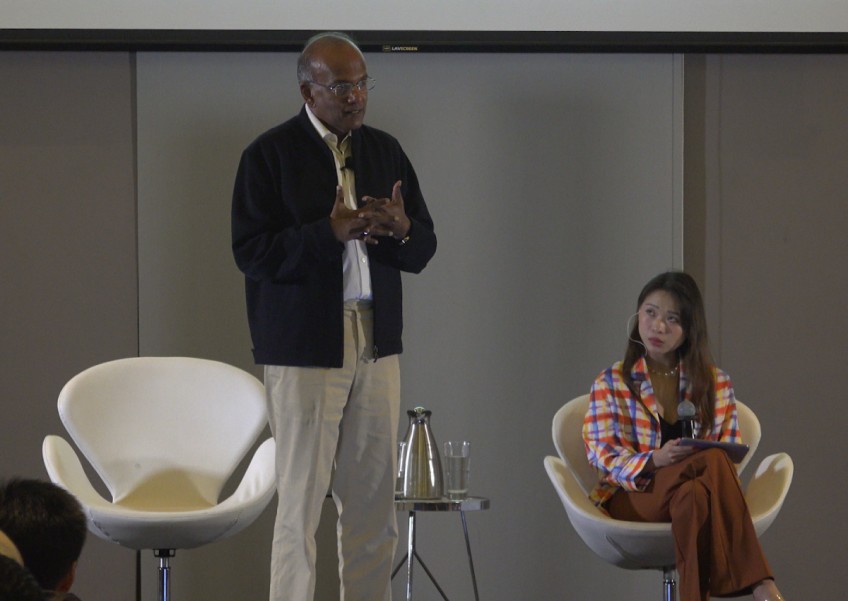'My policies save more lives than it takes away': Shanmugam on capital punishment for drug traffickers


 PUBLISHED ONSeptember 21, 2023 9:31 AMByClaudia Tan
PUBLISHED ONSeptember 21, 2023 9:31 AMByClaudia TanWhen it comes to developing policies on drugs and the death penalty, Minister for Law and Home Affairs K Shanmugam feels that a "soft heart" and a "hard head" are needed.
This means having compassion, but also a hard head to "analyse and understand facts", he explained.
"And then the question is, how do you marry the two?"
Shanmugam was speaking to and fielding questions from 80 youth leaders at the Asian Civilisations Museum on Wednesday (Sept 20) evening during a dialogue on drugs and the death penalty.
Kicking off the session, Shanmugam spoke about Singapore's approach towards drugs and the death penalty, saying that the latter is not something that any government can start off wanting but rather, the Government must be sure that this is essential to saving more lives.
If it cannot be sure the death penalty is essential to saving more lives, then the Government should not have the death penalty, he added.
This two-hour session was organised by the Ministry of Home Affairs (MHA) and National Youth Council (NYC).
One participant asked the minister about the moral and ethical implications of capital punishment, especially when it involves the "deliberate and irreversible decision of taking a human life by the state".
"That's what my entire speech is about," said the minister, adding that the question was similar to the narratives of anti-death penalty activists.
"I can argue or I can put forward discussion points based on evidence, which I have," he replied.
"But if you start from the position that it's just wrong for a state to have the death penalty regardless of the facts, that means even if I show you that 10,000 lives have been saved, while 16 have been hanged, and if you say 'Well, that's irrelevant, the state just shouldn't execute', I respect that position."
Since resuming executions in March 2022, Singapore has executed 16 individuals for drug trafficking offences.
"I'm not saying that it's wrong, but it's a position based on ideology. It's based on values."
He then countered that he comes from "slightly different values", which is the state's obligation to ensure safety and security within Singapore, and to save lives.
"And my policies save more lives than it takes away, and a lot more lives which actually would be lost," he said.
"But once we discuss it along the lines of ideology, then we just have to agree to disagree."
In dealing with the issue of drugs in Singapore, Shanmugam shared that the government takes a three-pronged approach: preventive drug education; tough laws and vigorous enforcement and evidence-based rehabilitation and aftercare.
The death penalty, he explained, is one aspect of a series of measures and laws dealing with drug abuse.
However, it only applies to drug traffickers who bring in a significant amount of drugs.
For instance, traffickers who are caught with more than 15 grams of heroin could face the death penalty. This amount can be converted to 1,250 straws, which is enough to feed the addiction of about 180 abusers for a week.
The Home Affairs Minister also presented statistical evidence of the effectiveness of capital punishment.
The numbers showed that within four years of the death penalty being introduced for trafficking more than 1.2 kilograms of opium in 1990, the average net weight of opium trafficked was reduced by 66 per cent.
In another study conducted by MHA in 2021, 87 per cent of regional participants believed that the death penalty makes people not want to traffic a substantial amount of drugs into Singapore.
83 per cent of these participants also believed that the death penalty is more effective than life imprisonment when it comes to discouraging people from trafficking drugs into Singapore.
One participant also asked why the President rarely granted clemency, where Shanmugam replied that those on death row had gone through the entire legal process. And have been been found guilty beyond a reasonable doubt.
“On what basis does the cabinet then recommend clemency? Basically, then you will be subverting the judgment of the court and the law... So it’s very very exceptional circumstances something has happened after the penalty was imposed,” he said.
Presenting some facts and research findings on the global impact of drugs, Shanmugam referenced a report from NBC which stated that in 2013 alone, more than 27,000 babies were born addicted to opioids like heroin or prescription painkillers in the US.
Driving his point home, Shanmugam presented a picture of a drug abuser's home in Singapore, where drug enforcement officers found the abuser's nine-month old baby in close proximity of drug paraphernalia.
[embed]https://www.instagram.com/p/CfLCHv_IjSX/?hl=en[/embed]
"You talk about compassion. Multiply this a thousand-fold is what you would get if you're going soft on drugs, because this is the norm seen in many countries.
"Lots of people, the activists cry for death row traffickers, but who cries for these children?" he asked.
claudiatan@asiaone.com